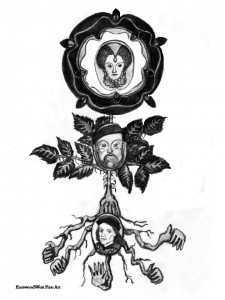Tudor Tutorial
Posted in General, On This Day on September 7th, 2009 by Eugene Finerman – 2 CommentsSeptember 7, 1533: Anne Boleyn’s Labor Day
 Her father declared her a bastard and beheaded her mother, her half-sister imprisoned her as a traitor and nearly ordered her execution. Elizabeth I would seem entitled to a psychosis or two, but she regarded these “episodes” as part of her job description.
Her father declared her a bastard and beheaded her mother, her half-sister imprisoned her as a traitor and nearly ordered her execution. Elizabeth I would seem entitled to a psychosis or two, but she regarded these “episodes” as part of her job description.
Aside from the obvious dysfunction, the Tudors were unique for royalty: they were intelligent and hard-working. The Tudors actually earned the throne.
After 85 years of civil war, the English throne had become quite democratic: anyone could seize it. Henry Tudor was a middle-class Welsh adventurer who even lacked the distinction of being legitimate. His claim to royal blood was as the half-second cousin, once-removed, of Henry VI. The successful usurper, proclaiming himself Henry VII, sought immediate respectability by marrying the eldest daughter of the rival royal house. (He then made sure that the rest of her family disappeared: in convents, the Tower of London, you get the idea) The crafty king took nothing for granted. He certainly didn’t trust the nobles, most of whom had better claims to the throne than he did.
To control a restless aristocracy, Henry VII created a force that remains as terrifying now as it was then: the civil service. His bureaucracy remorsely taxed the nobility into a passive stupor: nobles could still afford all of their vices but not an armed rebellion. In dealing with his other subjects–townspeople and small landowners–Henry had a novel approach: good government. The King had a most solicitous attitude. Any proposal or project that would resolve problems and nurture prosperity had his support. (That’s how the nobles’ taxes were spent.)
Henry VIII had his father’s political shrewdness. He may have been a serial husband but he maintained a monogamous romance with Parliament. That English institution had been founded in 1265 by English barons who realized that the Magna Carta had left a few loopholes. Its assembly of gentry, clergy, and burghers formed a permanent council: no law could be enacted without its consent. For two centuries, however, the Parliament had acted only like a notary public: approving and filing the royal decrees.
But to the crafty Tudors, Parliament was more than a bureaucratic eccentricity. Its members represented constituencies; the town burghers and small landowners were potential allies against the aristocracy and even the Catholic Church. Henry VIII applied his seductive skills to wooing Parliament. If a serenade of Greensleeves was insufficient, a knighthood on a status-starved burgher or the deed to an estate (freshly confiscated from the Catholic Church) usually proved irresistible. Of course, Henry’s approach also had an element of menace. Imagine the choice confronting a member of Parliament: the King’s munificent patronage or being publicly disemboweled. Under those circumstances, you, too, might agree that the King was entitled to a divorce and that Thomas More was just being obnoxious.
If Elizabeth I could survive her family, she could easily contend with Spain, the Jesuits and her idiot cousin Mary. She possessed all of the Tudors’ talents, few of their vices (just a bit of her father’s vanity), and a charm uniquely her own. Unfortunately, a Virgin Queen is bad for a dynasty.
But the Tudors did save their best for last. Happy Birthday, Your Majesty!